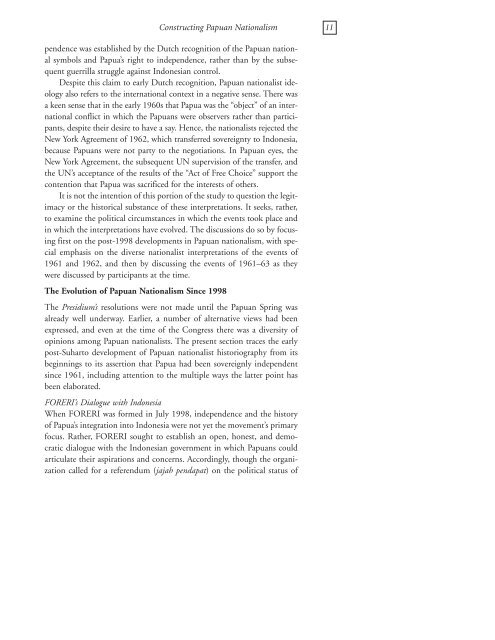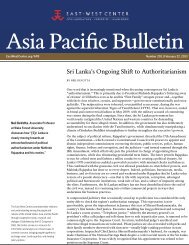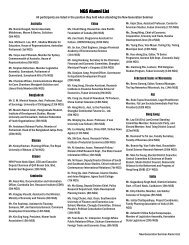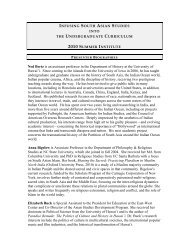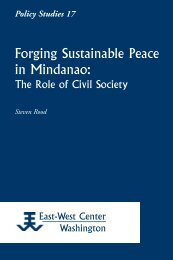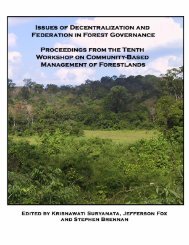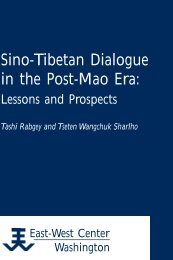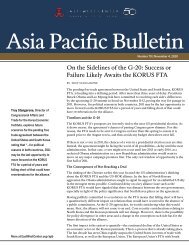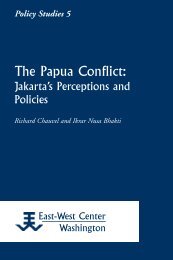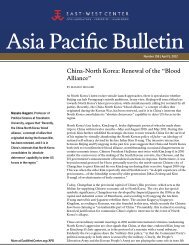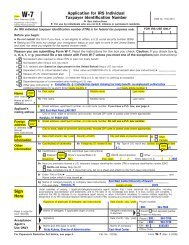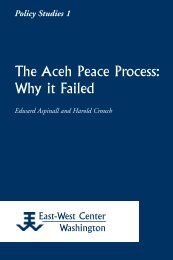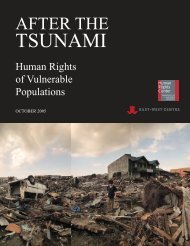Constructing Papuan Nationalism: History, Ethnicity ... - ScholarSpace
Constructing Papuan Nationalism: History, Ethnicity ... - ScholarSpace
Constructing Papuan Nationalism: History, Ethnicity ... - ScholarSpace
- No tags were found...
You also want an ePaper? Increase the reach of your titles
YUMPU automatically turns print PDFs into web optimized ePapers that Google loves.
<strong>Constructing</strong> <strong>Papuan</strong> <strong>Nationalism</strong> 11pendence was established by the Dutch recognition of the <strong>Papuan</strong> nationalsymbols and Papua’s right to independence, rather than by the subsequentguerrilla struggle against Indonesian control.Despite this claim to early Dutch recognition, <strong>Papuan</strong> nationalist ideologyalso refers to the international context in a negative sense. There wasa keen sense that in the early 1960s that Papua was the “object” of an internationalconflict in which the <strong>Papuan</strong>s were observers rather than participants,despite their desire to have a say. Hence, the nationalists rejected theNew York Agreement of 1962, which transferred sovereignty to Indonesia,because <strong>Papuan</strong>s were not party to the negotiations. In <strong>Papuan</strong> eyes, theNew York Agreement, the subsequent UN supervision of the transfer, andthe UN’s acceptance of the results of the “Act of Free Choice” support thecontention that Papua was sacrificed for the interests of others.It is not the intention of this portion of the study to question the legitimacyor the historical substance of these interpretations. It seeks, rather,to examine the political circumstances in which the events took place andin which the interpretations have evolved. The discussions do so by focusingfirst on the post-1998 developments in <strong>Papuan</strong> nationalism, with specialemphasis on the diverse nationalist interpretations of the events of1961 and 1962, and then by discussing the events of 1961–63 as theywere discussed by participants at the time.The Evolution of <strong>Papuan</strong> <strong>Nationalism</strong> Since 1998The Presidium’s resolutions were not made until the <strong>Papuan</strong> Spring wasalready well underway. Earlier, a number of alternative views had beenexpressed, and even at the time of the Congress there was a diversity ofopinions among <strong>Papuan</strong> nationalists. The present section traces the earlypost-Suharto development of <strong>Papuan</strong> nationalist historiography from itsbeginnings to its assertion that Papua had been sovereignly independentsince 1961, including attention to the multiple ways the latter point hasbeen elaborated.FORERI’s Dialogue with IndonesiaWhen FORERI was formed in July 1998, independence and the historyof Papua’s integration into Indonesia were not yet the movement’s primaryfocus. Rather, FORERI sought to establish an open, honest, and democraticdialogue with the Indonesian government in which <strong>Papuan</strong>s couldarticulate their aspirations and concerns. Accordingly, though the organizationcalled for a referendum (jajah pendapat) on the political status of


